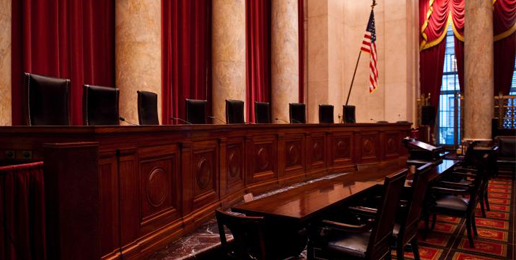
“Progressives” control academia, government schools, the mainstream press, access to information (e.g., Google), social media (e.g., Facebook), professional medical and mental health organizations, the arts, and are infiltrating even churches. And now they seek absolute control over the judiciary through “court-packing.” They want constitutional revisionists to dominate the U.S. Supreme Court even if that means expanding the number of Justices. And some of them openly share their reasons for this proposal, thus exposing the brazenness of their tyrannical quest to transform America into a totalizing and totalitarian “progressive” dystopia.
Todd N. Tucker, political scientist and fellow at the liberal think tank, the Roosevelt Institute writes that,
With Tuesday’s Supreme Court ruling upholding Trump’s Muslim ban, Wednesday’s decision attacking public sector unions, and Justice Anthony Kennedy’s announcement that he’s retiring, it is time to push a once-marginal idea to the top of the agenda: pack the Supreme Court…. A thoughtful court-packing proposal would ensure that the Court more carefully reflects the mores of the time, rather than shackling democracy to the weight of the past…. [T]he time to begin mainstreaming an enlarged Court is now.
The far wiser Richard Weaver, author of Ideas Have Consequences, wrote something a tad different about the weight of the past:
Whoever argues for a restoration of values is sooner or later met with the objection that one cannot return, or as the phrase is likely to be, “you can’t turn the clock back.” By thus assuming that we are prisoners of the moment, the objection well reveals the philosophic position of modernism. The believer in truth, on the other hand, is bound to maintain that the things of highest value are not affected by time; otherwise the very concept of truth becomes impossible. In declaring that we wish to recover lost ideals and values, we are looking toward an ontological realm that is timeless.
In an article for the online magazine Slate, Osita Nwanevu summarizes the pro-court-packing argument of David Faris, author of the troubling book It’s Time to Fight Dirty: “The argument you’re making here, in sum, is that the time has come for Democrats to throw out some parts of the rulebook of American politics and embrace radical, structural strategies.”
Faris explains—with no evident sign of irony—that his sense of “urgency definitely comes from just this long ideological march off to the right in the Republican Party. That, to me, is dangerous because the Republicans are no longer committed to the spirit of the constitutional framework as it exists. And they’re committed to policies that are going to wreak incredible havoc on this country.”
Have you ever pulled into a parking spot, looked at the stationary car parked next to you, and wrongly perceived your own car—which you forgot to put in park—as stationary and the other one as backing out? That’s the optical illusion Faris is experiencing. Faris wrongly perceives conservatives, who parked their ideological and political car securely with emergency brake activated, as moving rightward while in reality “Progressives” have careered madly leftward.
Faris ironically frets that “incredible havoc” will be wreaked by conservatives. Yes, a card-carrying member of the party that believes it’s ethical to kill humans in the womb for no reason other than that their mothers don’t want them; that destroyed marriage; that recognizes no intrinsic right of children to be raised by a mother and father; that wants to eradicate all public recognition of sexual differentiation; that wants to limit the exercise of religion to homes, hearts, and pews; that put Christian adoption agencies out of business; that seeks to force citizens to lie by using incorrect pronouns in the service of a science-denying cultic belief worries that conservatives will “wreak incredible havoc on this country” and is “no longer committed to the spirit of the constitutional framework.”
Maybe he’s right. Maybe conservatives aren’t committed to the “spirit,” or penumbras, or emanations of the Constitution. Maybe they’re committed to the text of the Constitution.
The fact that “progressives” in their opposition to constitutional textualists/originalists—whom they know approach the U.S. Constitution with more rigorous fidelity than do “progressive” Justices—focus almost exclusively on the possibility that Roe v. Wade may be overturned would seem a tacit admission that there exists no constitutional right of women to have their intrauterine offspring slaughtered.
Well, here’s some food for thought about Roe v. Wade from “progressives” who support the legal right of women to choose to have more vulnerable humans killed—quotes that shrieking feminists may find wholly unpalatable:
- “One of the most curious things about Roe is that, behind its own verbal smokescreen, the substantive judgment on which it rests is nowhere to be found.” (Laurence Tribe, Harvard Law School professor).
- “As a matter of constitutional interpretation and judicial method, Roe borders on the indefensible. I say this as someone utterly committed to the right to choose” (Edward Lazarus, former clerk to SCOTUS Justice Harry Blackmun).
- What, exactly, is the problem with Roe? The problem, I believe, is that it has little connection to the Constitutional right it purportedly interpreted. A constitutional right to privacy broad enough to include abortion has no meaningful foundation in constitutional text, history, or precedent—at least, it does not if those sources are fairly described and reasonably faithfully followed” (Edward Lazarus).
- “[A]s a matter of constitutional interpretation, even most liberal jurisprudes — if you administer truth serum—will tell you it is basically indefensible” (Edward Lazarus).
- “Blackmun’s [Supreme Court] papers vindicate every indictment of Roe: invention, overreach, arbitrariness, textual indifference” (William Saletan, Slate magazine writer).
- Roe “is not constitutional law and gives almost no sense of an obligation to try to be…. What is frightening about Roe is that this super-protected right is not inferable from the language of the Constitution, the framers’ thinking respecting the specific problem in issue, any general value derivable from the provisions they included, or the nation’s governmental structure. Nor is it explainable in terms of the unusual political impotence of the group judicially protected vis-à-vis the interest that legislatively prevailed over it.… At times the inferences the Court has drawn from the values the Constitution marks for special protection have been controversial, even shaky, but never before has its sense of an obligation to draw one been so obviously lacking” (John Hart Ely, clerk for Supreme Court Chief Justice Earl Warren).
- Roe “is a lousy opinion that disenfranchised millions of conservatives on an issue about which they care deeply.” (Benjamin Wittes, Senior Fellow, Brookings Institution).
- “[T]he very basis of the Roe v. Wade decision—the one that grounds abortion rights in the Constitution—strikes many people now as faintly ridiculous. Whatever abortion may be, it cannot simply be a matter of privacy…. As a layman, it’s hard for me to raise profound constitutional objections to the decision. But it is not hard to say it confounds our common-sense understanding of what privacy is. If a Supreme Court ruling is going to affect so many people then it ought to rest on perfectly clear logic and up-to-date science. Roe, with its reliance on trimesters and viability, has a musty feel to it, and its argument about privacy raises more questions than it answers…. “[Roe] is a Supreme Court decision whose reasoning has not held up. It seems more fiat than argument…. Still, a bad decision is a bad decision. If the best we can say for it is that the end justifies the means, then we have not only lost the argument—but a bit of our soul as well” (Richard Cohen, Washington Post columnist).
- “Judges have no special competence, qualifications, or mandate to decide between equally compelling moral claims (as in the abortion controversy) …. [C]lear governing constitutional principles… are not present” (Alan Dershowitz, former Harvard Law School professor).
- “In short, 30 years later, it seems increasingly clear that this pro-choice magazine was correct in 1973 when it criticized Roeon constitutional grounds. Its overturning would be the best thing that could happen to the federal judiciary, the pro-choice movement, and the moderate majority of the American people…. Thirty years after Roe, the finest constitutional minds in the country still have not been able to produce a constitutional justification for striking down restrictions on early-term abortions that is substantially more convincing than Justice Harry Blackmun’s famously artless opinion itself. As a result, the pro-choice majority asks nominees to swear allegiance to the decision without being able to identify an intelligible principle to support it” (Jeffrey Rosen, George Washington University Law School professor, former clerk to Judge Abner Mikva).
- “Liberal judicial activism peaked with Roe v. Wade, the 1973 abortion decision…. Although I am pro-choice, I was taught in law school, and still believe, that Roe v. Wade is a muddle of bad reasoning and an authentic example of judicial overreaching” (Michael Kinsley, attorney, political journalist).
- “[I]t is time to admit in public that, as an example of the practice of constitutional opinion writing, Roe is a serious disappointment. You will be hard-pressed to find a constitutional law professor, even among those who support the idea of constitutional protection for the right to choose, who will embrace the opinion itself rather than the result. This is not surprising. As constitutional argument, Roe is barely coherent. The court pulled its fundamental right to choose more or less from the constitutional ether. It supported that right via a lengthy, but purposeless, cross-cultural historical review of abortion restrictions and a tidy but irrelevant refutation of the straw-man argument that a fetus is a constitutional ‘person’ entited [sic] to the protection of the 14th Amendment…. By declaring an inviolable fundamental right to abortion, Roe short-circuited the democratic deliberation that is the most reliable method of deciding questions of competing values” (Kermit Roosevelt, University of Pennsylvania Law School professor).
- “The failure to confront the issue in principled terms leaves the opinion to read like a set of hospital rules and regulations…. Neither historian, nor layman, nor lawyer will be persuaded that all the prescriptions of Justice Blackmun are part of the Constitution” (Archibald Cox, JFK’s Solicitor General, former Harvard Law School professor).
Roe v. Wade, my friends, is the SCOTUS decision that “progressives” argue absolute fidelity to precedent demands Justices uphold. If they think “lousy,” “indefensible,” “barely coherent,” unintelligible, a-constitutional non-reasoning must be honored in slavish service to the political end of allowing feticide, I hate to imagine what they would have thought about revisiting Dred Scott.
IFI depends on the support of Christians like you. Donate now
-and, please-


























